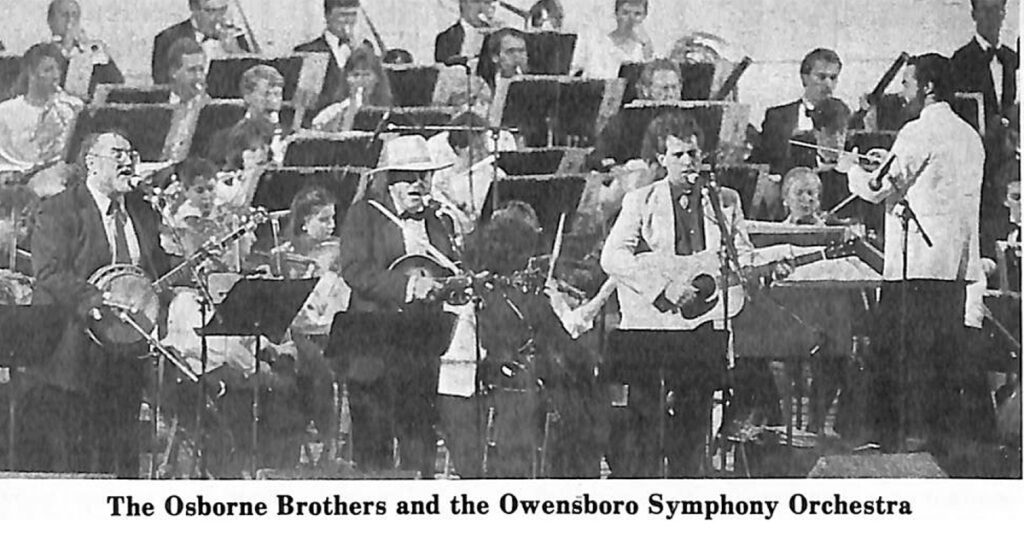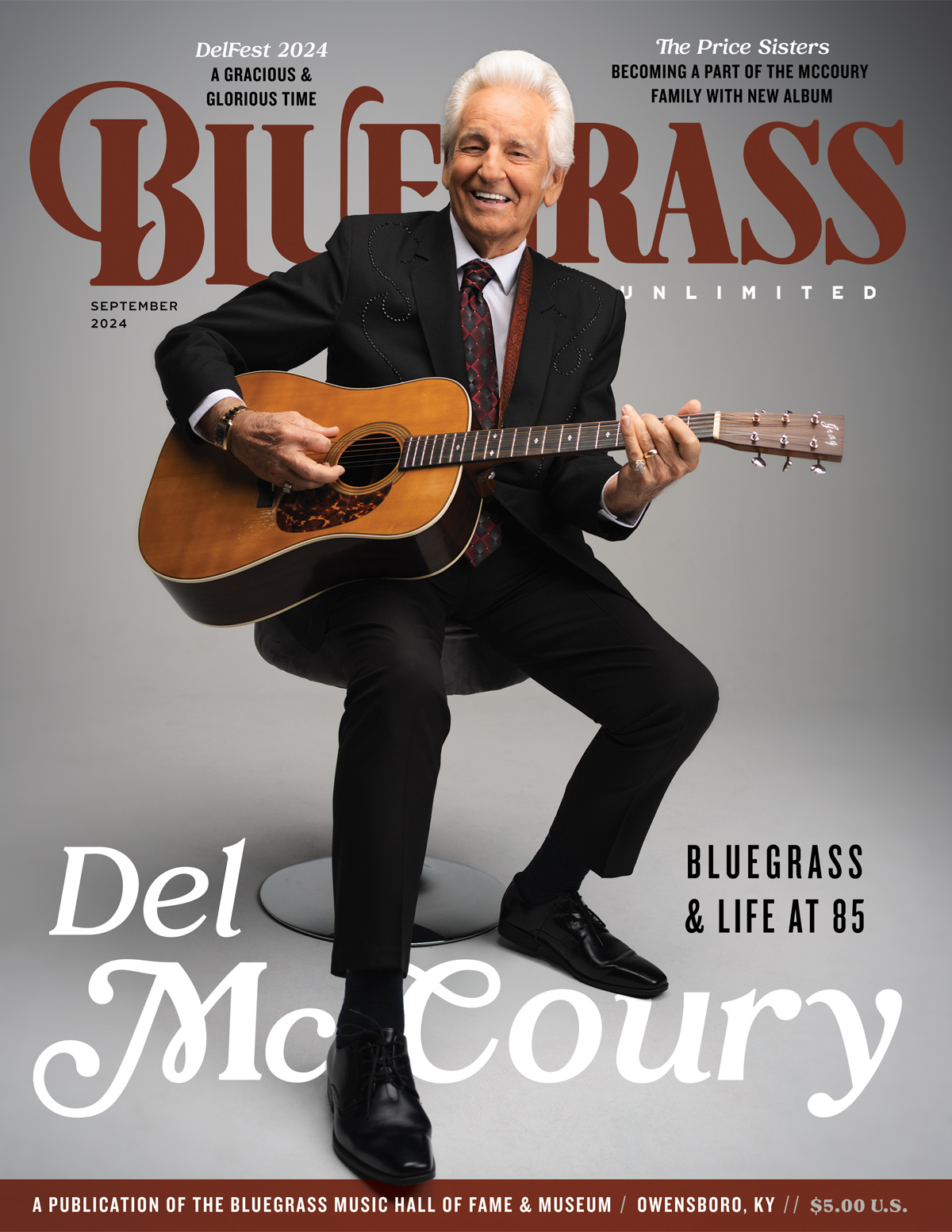Home > Articles > The Archives > IBMA’s World of Bluegrass
IBMA’s World of Bluegrass
Reprinted from Bluegrass Unlimited Magazine
November 1987, Volume 22, Number 5
Even the setting was perfect —the Banks of the Ohio in the Bluegrass State.
During the last week of September, the International Bluegrass Music Association put on a celebration in Owensboro, Kentucky, that had something for just about everyone who loves bluegrass — or who makes a living from it.
IBMA’s World of Bluegrass trade show, which got its start in 1986 under a tent in Peter B. English Park in Owensboro, moved to the Executive Inn Rivermont for its first full-scale edition. More than 200 businesses were represented at the trade show, which was coupled with a series of Fan Fest concerts at the nearby riverfront park.
“It went wonderfully — I don’t know any other way to say it,” was the assessment of Nashville agent-manager Keith Case, a member of IBMA’s board and one of the main craftsmen who produced the event.
“For a first-year event I think the representation was incredible.”
Taken as a whole, the trade show/concert series represented both the music-obsessed tradition and the business-oriented leanings of bluegrass. About 150 musicians registered both to attend trade show events and perform free at the Fan Fest, which benefited the IBMA trust fund for bluegrass professional’s emergencies. As at any convocation with more than thirty bands and lots of other musicians present, there was formal and informal music around the clock and time to greet old acquaintances and meet new ones.
If a new professionalism was in the air at the World of Bluegrass, the event was driven by the high-quality, exciting music heard at the outdoor festival including the Father of Bluegrass, Bill Monroe and the Blue Grass Boys, and at showcases in the Rivermont’s classy Show Room Lounge. In the same venue where the hotel presents acts such as Willie Nelson and Dolly Parton, the finest in traditional and innovative bluegrass acts held forth.
Former Blue Grass Boy Peter Rowan, whose music features a variety of different styles on a traditional foundation, proclaimed his allegiance to bluegrass during an ecstatically received showcase with the Nashville Bluegrass Band.
“As you can see, we’re not going to let it die and I know you’re not,” Rowan told the audience of musicians and professionals. “So let’s keep it going together, what do you say?”
More than thirty acts performed at the hotel showcases. They were mostly top-grade, up-and-coming bands who benefited from exposure before the promoters and label heads present.
“The established acts that did showcase — like Hot Rize, the Country Gentlemen and Doyle (Lawson) — did it purely to show support and be part of the event,” Case said.
Friday night’s showcase was noted by many of those present as especially full of musical fire. Chicago’s Special Consensus got things rolling with a triple-yodel version of the Sons of the Pioneers’ “Way Out There.” The Short Crick Flatpickers ranged from straight bluegrass to hard country.
A real highlight of the week’s music was the appearance of sixteen-year-old fiddler-vocalists Alison Krauss with the Union Station band from Champaign, Illinois. Krauss’ co-lead vocalists Dave Denman missed the show because of a family tragedy, but his place was ably filled on short notice by Hot Rize’s multitalented Tim O’Brien. Krauss’ performance was simply astonishing—she’s a very good, aggressive bluegrass fiddler and a strong, moving vocalist. The sky seems to be the limit for her.
The Nashville Bluegrass Band continued their rise to recognition as a topline festival and recording attraction with their sizzling performance at Friday night’s showcase. Their combination of classy picking, bluesy bluegrass singing, black gospel harmony and unaffected showmanship won them top marks with the promoters and others present.
In his gesture of IBMA solidarity, Charlie Waller showcased the latest edition of the Country Gentlemen. They obliged with some new tunes as well as perennials such as “Matterhorn” and “The Rebel Soldier.”
The evening concluded with Rowan’s performance. He came out first with Dobro king Jerry Douglas for a taste of the Crucial Country band songs the two have played in Nashville with acoustic stars Roy Huskey and Mark O’Connor. Then the Nashville Bluegrass Band returned.
With Douglas still on stage, the all-star assemblage rocked through a satisfyingly long set of Rowan tunes and straight bluegrass that crackled with energy and excitement. The Rowan-NBB combination has been in the studio recording for an album project for a label yet to be selected, so fans should have a chance to hear this music sometime in 1988.
If all the great music heard at IBMA ’87 is to reach wider audiences, the bluegrass industry will have to seek new means of adding to the music’s faithful core audience. There was recognition of that in the real-world, professional atmosphere surrounding the trade show’s many opportunities to exchange information. Perhaps IBMA executive director, Art Menius, wasn’t exaggerating so wildly after all when he predicted the event would be “the most significant business event in the history of the bluegrass music industry.”
“All the attendees were just blown away by the amount of energy and activity,” Case, who represents artists such as Rowan and John Hartford, said after returning to Nashville.
On a meat-and-potatoes level, the trade show consisted of a series of professional seminars and an exhibit floor representing talent, publications, radio stations, sound reinforcement and other areas. Seminar topics included record labels and albums, contract negotiations and riders, band marketing, radio and records, festival planning, insurance for promoters, bluegrass associations and bluegrass radio.
“At the two meetings that really related directly to promoting, I had the most successful promoters in bluegrass coming out saying, “My God I can’t believe what I’ve learned,’” Case said.
A sampling of the several dozen exhibit-floor booths would include those of Martin Guitar, Gibson Guitar, South Plains College, Lee Olsen and Associates, Southard Audio, Bluegrass Unlimited, the Grassometer, Chesnut Mandolins and record companies including Sugar Hill, Rounder, Rebel, Flying Fish, and Turquoise.
The exhibit area, in the Executive Inn’s basement, was a favorite hangout for pickers or industry people in between seminars or showcases. Norman Blake took a break from picking fiddle tunes on the newest products from Martin to record station IDs for a bluegrass radio station. Gibson’s Nashville plant sent what looked like a pickup load of its new acoustic models. Picker-educators Alan Munde and Joe Carr touted the opportunities offered at South Plains College in Levelland, Texas, where both are faculty members.
“Levelland is the truth in advertising capital of America,” Carr said about the table-flat country around the West Texas school.
Friday’s magic several hours of music were preceded by a banquet and awards ceremony in which five pioneering souls were honored for “lifelong, significant and selfless contributions to bluegrass music.” Washington-area radio announcer Don Owens was remembered posthumously for his unstinting efforts to promote bluegrass records over the air and his favored practice of “back-announcing,” naming sidemen on a record after it was over.
Country Gentlemen kingpin Waller was honored for his more than 30 years of picking and singing and his championing of legions of sidemen, about who it was remarked that, “some have gone on to great success and others have just gone.”
“I’m not much for saying words — unless they’re in a song, but I appreciate it,” Waller told the IBMA crowd.
Snuffy Jenkins got an IBMA certificate in absentia for his early three-finger banjo style and his decades of entertaining. Promoter Bill Jones got the organization’s nod for taking bluegrass into uncharted territories. And musician-scholar-manager Ralph Rinzler, whose award was accepted by singer-songwriter Hazel Dickens, was recognized for furthering Bill Monroe’s career and myriad other services to bluegrass.
Terry Woodward, an IBMA board member and head of a local tourism commission, announced the association’s move to permanent headquarters in Owensboro and the establishment of a committee to seek state funds for a bluegrass museum there.

